Early Votes, Digital Vote Counting Machine, and Digital Election Fraud Suspicions in South Korea
2020-5-6, Tara O (Updated on 2020-5-14 with the updated eforensics report dated 2020-5-13)
One of the pillars of a liberal democracy is free and fair elections. Trust in, and the integrity of, the electoral process are vital to achieving free and fair elections. Election fraud invalidates the legitimacy of elected candidates and governments and destabilizes societies. If enough suspicions arise, questioning the credibility of the election process, then further steps are needed to restore confidence in the system. Numerous suspicions of election fraud arose during and after South Korea’s general election in April 2020, especially a new field of digital fraud involving vote counting machines, computer hardware and software, and Huawei information network telecommunications equipment. It also involved QR codes present only in the mail in and early-voted ballots.
Analog vs. Digital Fraud
Committing an analog method of fraud of ballot switching, while possible, requires a lot of manpower, perhaps hundreds of people. For digital fraud, it only takes a few–a planner, a software programmer, and possibly a go-between person. This small number of people involved makes it much easier to hide the fraud. (5:08)
The ballot counting machines need instructions for sorting and counting. The instructions can come from the QR codes on the early-vote ballots as they are counted, or it can also be sent from an external source to the vote counting central server using the internet, e.g, the LG U+ network. (5:46) Either way, it can produce an outcome that is different than the voters’ intent.
The IT
The IT Network
The National Election Commission chose LG U+ 5G, which uses Huawei equipment, to provide internet and wifi for handling the pre-vote ballots. Instead of establishing its own secured network, which it could have had by using the very secure Gwangju/Daejeon Information Data Center (IDC), NEC chose an unsecured network, and worse, used a network that uses Huawei equipment notorious for control by China. (2:00) Here is what is possible: The servers used at the election sites can be connected to servers in China (or elsewhere), and the user on that end in China can send the instructions to the central server in South Korea, which in turn sends a message to the vote counting machines. It would be even more helpful for the server operator on the other end in China, if those with access to the central server in South Korea sent the user ID, password, and the port number to the server in China, which is also a possibility. The “other end” does not necessarily need to be in China. Again, this is a potential scenario.
QR Code vs Bar Code
Vote tallying machine reads the ballots through optical recognition characters, such as QR Codes and Bar Codes.
The QR Codes were used on the early/mail-in ballots while Bar Codes were used on the election day ballots. Why were they not uniform? One theory is that the software in the central server needed the difference to instruct the vote counting machine to treat each differently. (10:52) For instance, the software can have instructions to count the Bar Codes as the citizens voted, but for QR Codes, count them differently regardless of how the voters voted. For instance, it can be instructed to re-route every 4th ballot that was voted for one party to another party. What kind of instructions the software contains really depends on the imagination of the programmer, given a specific purpose.
A QR Code can store a lot more information about the voters. It can also store instructions or identifiers that a software of the vote counting machine can follow or recognize. The machine, rather than sorting by who/what the voters selected, can sort based on the information it recognizes on the QR Code. This method would not necessarily need an external server sending instructions.
The Carter Center assessment of the 2018 elections in the Democratic Republic of the Congo (DRC)
The Carter Center’s report on its assessment of the 2018 elections in the Democratic Republic of the Congo (DRC) raises concern about the use of electronic methods and QR codes in elections, because “by their very nature, electronic voting systems require procedural steps that stakeholders cannot observe using traditional methods” and it is difficult to assess the contents of the QR codes on each ballot. (p. 44)
It further points out:
Collectively, these procedures could potentially jeopardize both the secrecy of the ballot and the integrity of the results. Their actual impact cannot be assessed without specialists with information technology (IT) expertise who have access to parts of the IT systems. For instance, if there are concerns that electronic records were not duly randomized, an audit would be needed to provide conclusive evidence. Similarly, QR codes could also contain inappropriate content; a computer-based analysis would be needed to confirm such a hypothesis. And, because of a lack of information, independent analysts were not able to assess whether deliberation teams at compilation centers relied on electronic results rather than manual tallies.
(p. 45)
The use of electronic voting machines impeded the observation of voting operations in some polling stations. In addition, the use of voting machines raised concerns about the secrecy of the ballot. The electronic record of votes, as well as the “quick response” or QR codes, which identified ballots by province and also served to prevent forgery, could, if a sequential order was used, link the content of a ballot to a given voter. Similarly, analysts pointed out that the software could be designed, on purpose or by mistake, to not record votes as intended, to the benefit of specific candidates, regardless of what was shown in the screen or in the printout.
(p.62)
The use of the QR codes and the electronic method in general in the elections creates numerous vulnerabilities that opens elections to a much greater possibility of fraud.
South Korea’s general election on April 15, 2020
The percentage of the early votes/mail-in votes were surprisingly high at 26.69%, (0:18) and in many cases, reversed the outcome on the election day. The ruling Deobureo Minjoo Party (Democratic Party of Korea) and its satellite party Deobureo Simin Party together won by a landslide, gaining 180 seats (of 300 seats), which is a simple majority to change laws at will, except for the few that require a super majority (2/3), such as the Constitution.
There are other liabilities, such as ballots being transported in open baskets (see video here). The Citizens’ Solidarity for Fair Elections also posted stickers urging the citizens to vote on the actual election day, not early-vote, due to concerns about the security and the break in the chain of custody of the early vote ballots, but the National Election Commission (NEC) dismissed their concerns, and instead sued the group for “distributing false facts.” (1:04)
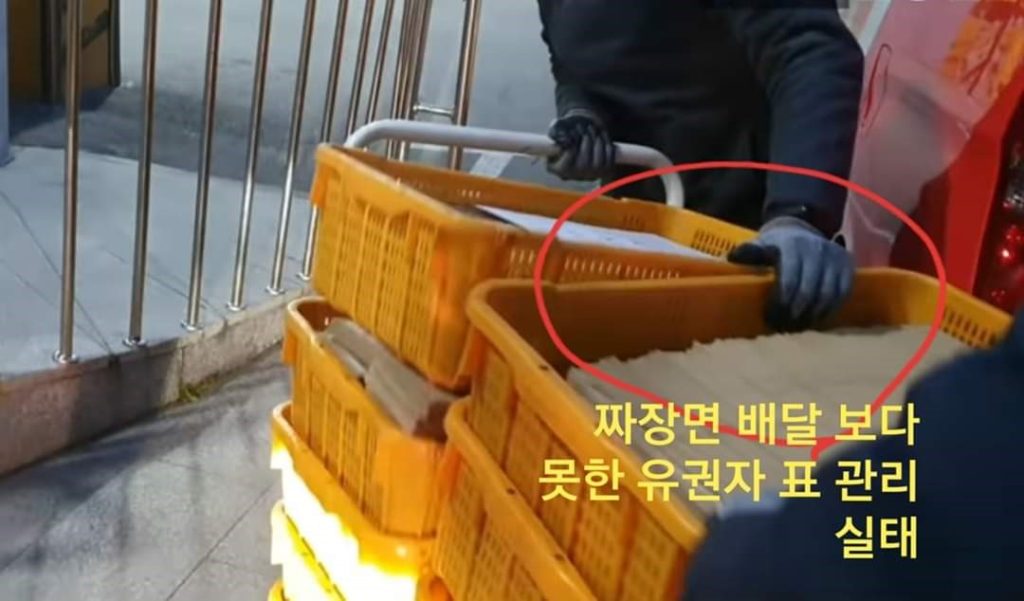
While there are other suspicions, such as pre-printing the election supervisor’s seals on the ballots for early votes and the National Election Commission’s refusal to install CC Cameras in where the early-voted ballots are stored, the focus of the report will be on statistics and the serious vulnerabilities of digital vote counting aspect to election fraud on a large scale. With the advent of technology, along with changes to laws to allow early- and mail-in voting, numerous vulnerabilities were created in what should be a process marked by trust, integrity, security, and accountability as high or higher than that used in criminal investigations.
Election Data and Statistics
In addition to the above suspicions, statistics have provided further concern of fraud. A YouTuber Vasilia TV downloaded the data from the National Election Committee (NEC) website and conducted an analysis. He noticed a large difference between the 20th and 21st (April 2020) general elections. Whereas the difference between the early votes and the election day votes were in the 0-7% range and irregular, the 21st election showed that its was about 10-15% higher for the Democratic Party of Korea (Deobureo Minjoo), while about 10-15% lower for the United Future Party, and more consistently. (0:25)
He points out that the vote counting machine system is more than the vote counting machine, as it also includes the server, the software notebook, and the internet. (6:02)
Additional controversy arose when 37 districts had more voted ballots than eligible voters. The voters have demanded the National Election Commission to make public the source code used in the software for the early-vote operations, but the Commission refused. While making the source-code public seems like it would decrease the security of the voting machine, it actually increases security and transparency because security researchers are able to evaluate and propose solutions to make the software more secure. Also, it is much easier to conduct a forensic analysis to determine whether software has been tampered with when the code is made public.
Professor Walter Mebane, Jr.’s eforensics statistical model
Professor Walter MeBane’s report “Anomalies and Frauds in the Korea 2020 Parliamentary Election∗” is causing a stir. Walter MeBane is a professor of Political Science and Statistics at University of Michigan, and he is the leading expert on detecting fraud in elections. His Election Forensics (eforensics) is “a positive empirical model, developed by using a general Bayesian framework using finite mixture models of product distributions to identify the probability and distribution of frauds in elections.” He had also used the eforensics statistical model to detect fraud in elections in Bolivia in 2019, the Democratic Republic of Congo in 2019, and Kenya in 2017.
The eforensics model “offers evidence that fraudulent votes occurred in the election that may have changed some election outcomes. The statistical model operationalizes the idea that ‘frauds’ occur when one party gains votes by a combination of manufacturing votes from abstentions and stealing votes from opposing parties. The Bayesian specification 2 allows posterior means and credible intervals for counts of ‘fraudulent’ votes to be determined both for the entire election and for observed individual aggregation units.” (p. 1)
The eforensics model shows that “Covariates for turnout and vote choice include indicators for pre-vote, voting post,abroad and disabled-ship status and fixed effects for the 253 constituencies included in the data. The two specifications agree that 446 aggregation units are fraudulent, but 761 additional units are fraudulent in the Democratic party specification and 807 additional units are fraudulent in the constituency-leading party specification.” (p. 6)
Mebane noted in the report that in the Democratic Party of Korea focused observations (Figure 4), “Visually and by the numbers, frauds occur most frequently for pre-vote units (28.7% are fraudulent), next most frequently for for district-level, election-day, not abroad unts (2.43% fraudulent) then next most frequently voting post election day units (.67% are fraudulent) then abroad units (.61% are fraudulent).” (p. 6)
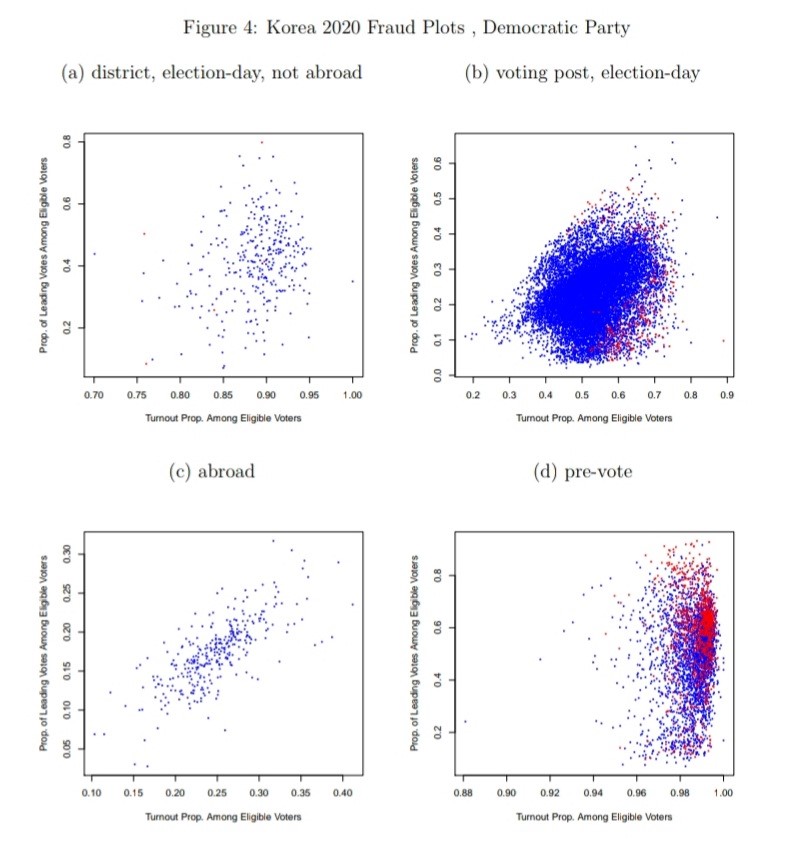
In constituency-leader focused observations (Figure 5), “Visually and by the numbers, frauds occur most frequently for pre-vote units (25.0% are fraudulent), next most frequently for district-level, election-day, not abroad unts (2.04% fraudulent) then next most frequently for voting post election day units (1.52% are fraudulent). None of the abroad units are fraudulent.” (p. 6)
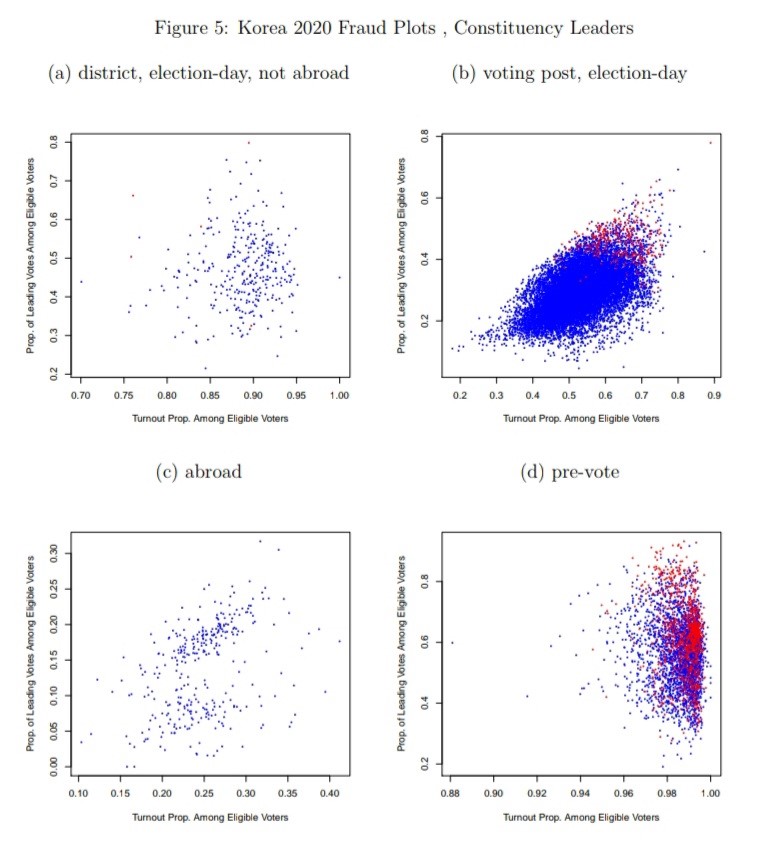
In both cases, the data suggests fraud occurred and it occurred most frequently in pre-votes.
The eforensics Model shows:
Democratic Party (Deobureo Minjoo Party) focused specification overall about 1,418,079 votes are fraudulent, and of the fraudulent votes about 1,056,462 are manufactured (the remaining 361,617 are stolen—counted for the leading party when they should have been counted for a different party). Overall, according to the eforensics model, about 9.9% of the votes for the Democratic Party candidates are fraudulent…manufactured votes are votes that the model estimates should have been abstentions, but instead were observed as votes for the leading party. The results show that for the constituency-leading-focused specification overall about 1,234,217 votes are fraudulent, and of the fraudulent votes about 961,296 are manufactured (the remaining 272,921 are stolen—counted for the leading party when they should have been counted for a different party). Overall, according to the eforensics model, about 7.7% of the votes for constituency-leading candidates are fraudulent.” (p. 11)
The report also shows that in 22 of 231 constituencies, the number of fraudulent votes is large enough apparently to change the winner of the constituency contest. An interesting point is that “in 15 instances the apparently fraudulently winning party is the “Democratic Party,” and in 7 instances, it is the “Future Integration” Party” [aka United Future Party]” (pp. 11-12)
“Taken together the eforensics estimates and EFT and spikes tests exhibit anomalies that strongly suggest the Korea 2020 legislative election data were fraudulently manipulated.” (p. 18)
The report caveats that “‘Such conclusions are always subject to the caveat that apparent frauds may really be consequences of strategic behavior, but that ambiguity can sometimes be mitigated by exploiting a multiplicity of statistics…. An election fraud will not necessarily trigger all of the statistics and tests, but we think a genuine fraud will in general set off many of them’” and that this finding should be followed up with further information and investigations to determine what occurred. It also suggests that the “most important, and in principle perhaps simplest to do, is to validate the paper ballots, and once they have been validated, to count the paper ballots manually.” (p. 18)
For more information on Mebane’s report, see here.
Integrity Analysis of October 20, 2019 Election in Bolivia
On November 1, 2019, the Organization of American States (OAS) began performing an audit to analyze the integrity of the October 20, 2019 elections in Bolivia and later published its preliminary findings. The Bolivian government agreed to provide “every facility needed to perform a proper audit of the official vote count in the elections of October 20, along with verification of the tally sheets, statistical aspects, the electoral process, and the chain of custody” as well as full access to installations and information the team deemed relevant.
[Note: The OAS is a regional organization with 35 member countries in North America and South America. The above report is here, and it was prepared by the Department of Electoral Cooperation and Observation (DECO), under the Secretariat for Strengthening of Democracy (SSD) of the OAS. For more on the organization, see here.]
The team comprised “36 specialists of 18 different nationalities, including electoral attorneys, statisticians, IT experts, document specialists, handwriting experts, experts in chain of custody and experts in electoral organization.”
The team’s method of verifying the integrity of the election and the reliability of the result “acquire detailed insight into the processes involved in the vote count, the transmission of preliminary results, the official tally, and the chain of custody of electoral materials.”
Specifically, the team audited:
a. The authenticity and reliability of the vote count records (tally sheets) and of the data input into the electoral results transmission system and the official count system.
b. The Plan for comprehensive custody of all electoral materials (tally sheets, ballots, voters register).
c. Infrastructure and operation of the I.T.systems used to transmit preliminary results and the official count.
d. Uploading flows of the data on preliminary electoral results and the official count
The team found numerous flaws in the election results transmission system (server, network, etc.), including unmonitored data transmission routes, data traffic redirected to servers outside the official system, and changing the IP of 350 servers while the voting occurred. Regarding the official count, they found other concerns, such as the app provider gaining direct access to the server, flaws in the calculation algorithm, and direct access to modify data in the database given without going through the app. Further problems include forged signatures, alteration of tally sheets, and deficient chain of custody,
Responses from the opposition
Due to election fraud suspicions, National Assemblyman Min Kyung-wook (민경욱), United Future Party, on April 28, 2020, filed with the Yeonsu District Court in Incheon to preserve the election materials for further investigations. Min lost by 2,893 votes to Democratic Party of Korea’s Jung Il-yong (정일영). (The elected candidates will take their seats as of May 30, 2020.) The court granted preserving the ballots, but not the server and other information and communications gear.
The servers used for the election are rented from a contractor and they are to be destroyed on May 1, 2020. Servers are not the only crucial part of the election system, as seen in the audit report of the 2019 election in Bolivia, but contain the software and other information logs, so preserving the servers is key to the investigations in determining whether fraud occurred. By rejecting the request to preserve the servers and other communications equipment gear, the judge’s decision is tantamount to destroying the evidence.
Additionally, the Yeonsu District Election Commission handed over the same day ballots, but defied the court order and refused to provide early-vote ballots. Thus, the actions of the judge and the local election commission also raise suspicions that erodes the public confidence in the election process and outcome.
Others, such as the Christian Liberty Unification Party, also have submitted a request with the court to preserve the servers and other election materials. (4:24)
The rest of the United Future Party has not been forthcoming in supporting its member Min Kyung-wook. In fact, Lee Jun-seok (이준석), who also lost the election, has been not only been vocal in denying that there were election frauds, but also extremely hostile toward those who raise the issue, stating his “party should not be at the level wielded by YouTubers,” earning the ire of the YouTubers and other conservatives, who have been making efforts to defend liberal democracy that has been weakening, and are alarmed by the the suspicions of electoral fraud.
Hwang Kyo-ahn, the former leader of the United Future Party, resigned on the day of the election.
The citizens pressured the United Future Party to look into this matter, and the party leadership considered whether it should form a special committee, but it was more concerned with not appearing to disobey the election outcome, so the party remains quiet.
Thus, the burden of challenging and monitoring the situation is falling flatly on the concerned citizens, rather than the elected officials of the largest opposition party, the United Future Party, except one representative, who has less than a month left as a lawmaker.
“Terrified and Afraid”
Meanwhile, the winning party is also behaving oddly. It is remarkable by how muted the reaction has been from the Democratic Party of Korea. Yang Jung-cheol (양정철), the head of the Democratic Party of Korea’s think tank Institute for Democracy, which is responsible for the party’s election strategy, should have been elated at such a sweeping election victory, but was not. Yang, who is also President Moon Jae-in’s confidant, instead said he was terrified at the outcome and quickly resigned. When a journalist pointed out that he played the most important role in this election and asked for a comment, Yang’s answer was strange and cryptic.
Yang answered, “I’m terrified and afraid because they made such an enormous outcome (landslide victory for his party),” and expressed his desire to resign his position as the head of Institute for Democracy. Further, he expressed, “I’ll return to the backwaters and will stay quietly as if to wait for a sunset.”
Lee Geun-hyung (이근형), the Strategy and Planning Committee Chair of the Democratic Party of Korea, also crucial for the election strategy and outcome, also said he is leaving the position and the party, posting on his Facebook “I’m leaving with heavy weights off my shoulders.” Numerous netizens wondered if Yang and Lee had something to hide and are running away.
Yang also said “the reason we were able to come this far is due to courage and wisdom of party leader Lee Hae-chan (이해찬)…our party will pay respect to his leadership for a long time.”
Lee Hae-chan also did not express great joy, despite his party winning such an unprecedented number of seats. His expression was serious, and he said “as I look at the election results, I feel the heavy burden of responsibility, rather than the joy of victory.” (0:48) Neither he nor Lee In-yong (이인영, the floor leader) nor Lee Nak-yeon (이낙연, the Prime Minister who won a seat in the Jongno District) showed joy, not even a smile, which is very odd for the winning party.
Lee talked of his party seizing power for 20 years, and later increased it to 50 years and 100 years. In July 2019, Yang Jeong-cheol went to Beijing to sign an agreement between the Democratic Party of Korea’s Institute for Democracy and the Communist Party of China’s party school, perhaps to learn the secrets of the longevity of one party rule.
The Central Election Commission
Cho, Kyu-Young (조규영), Chairman, Election Division 1, National Election Commission, recognized that the controversy about a potential election fraud has not disappeared, but stated flatly that there will not be a recount. He further stated, “For those who feel a suspicion of fraud, we will disclose the requesting data in accordance with due process. Nevertheless, if they continue to raise suspicions of fraud and spread false information, we will take a strong action.”
As mentioned earlier, the National Election Commission already took “a strong action,” by suing the Citizens’ Solidarity for Fair Elections, charging the citizens’ group with “distribution of false facts” for posting stickers encouraging people to vote on the election day, rather than pre-vote.
On January 24, 2019, President Moon Jae-in appointed Cho Hae-joo (조해주) to the National Election Commission not only without an approval from the National Assembly, but also without even holding a hearing, which was unprecedented. The position is a ministerial level one.
The way an important position in the National Election Commission was appointed does not bring about confidence among the public. Additionally, the Commission threatening, rather than taking more proactive approaches to address the public concerns, is demoralizing.
Conclusion
Using technology to conduct election fraud, or at least irregularities, is certainly possible, and lax processes are genuine concerns, as seen in the Bolivian election in October 2019. Professor MeBane’s eforensics statistical model also shows “fraud” in South Korea’s general election in April 2020. South Korean citizens have also become more vigilant, and as such, noticed numerous questionable activities that raise the possibilities of fraudulent election.
In essence, the election process and outcome did not inspire confidence among the voters, but raised questions about them, and this is the real problem. In that case, steps should be taken to restore the confidence, such as conducting an investigation of the election similar to that of the OAS model, recount the votes, and change the election law or procedures to address the gaps and flaws in the election process to be applied to future elections.
Additionally, other democracies should take note about the increased potential for election fraud with the advent of new technology and procedures, and be careful about the vote counting machine system and the early voting process.
Free and Fair elections are too important to liberal democracy for the citizens to not demand integrity and transparency of the election process, and for the authorities to not take measures to enhance trust in the election system.

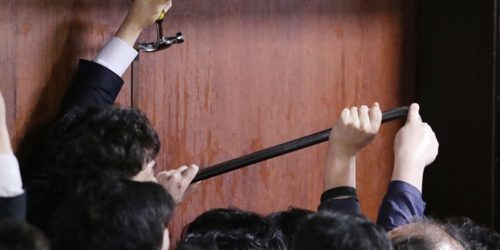
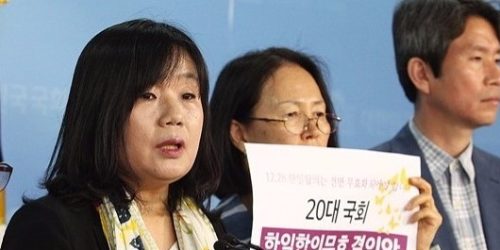
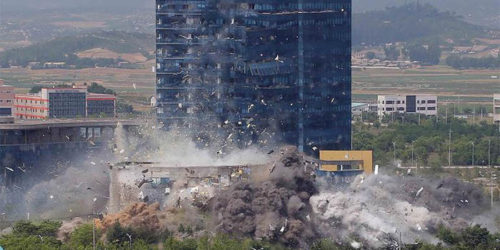
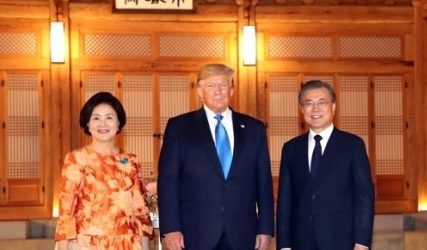
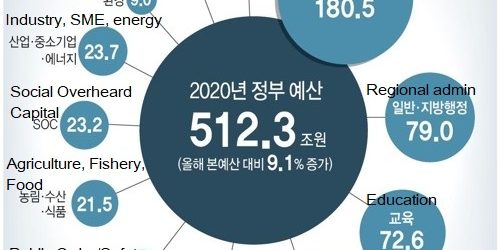
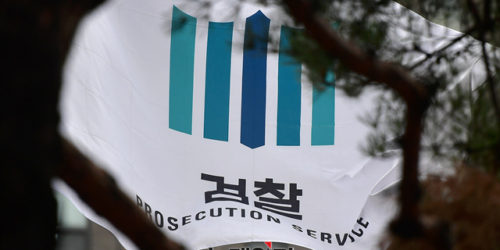
Thanks for paying attention to my country. I was surprised that you have great insight with this situation!
I really appreciate for this article and Tara O. I am seriously concerned about the suspicious events around South Korea Election Management Committee. We desperately needs the serious attention of global society. Please keep your eyes on the political situation around recent South Korea parliamentary election.
Please save South Korea from CCP.
https://petitions.whitehouse.gov/petition/petition-south-korea-elections-rigged-deliberately-ruling-party-and-moon-jae
Thank you for your precise report. Here in Korea, the Moon Government has got all the power over the news media, especially after the big winning of election 2020, so most of Korean citizens are not aware of possible election frauds despite of many proofs. The democratic party has not shown any response until May 1, 2020, when the hidden servers were supposed to be destroyed. Why did they have to? What is it that they are hiding? We need more attention and help from everyone to maintain our democracy.
Thanks Doctor. This is really serious. We should stand up to it but as the case in Bolivia the act from an organization in the U.S. seems vital. Please ask them to act!
Thank you. God bless South Korea!
Thank you very much for such an in-depth and accurate report. Please distribute as much as you can. The entire world should know this election fraud. Please help South Korea keep its democracy. Thank you again for putting together this report. This means so much to our country!!
Yes. It’s the beginning to disclose the overall fraudulence of the active government of ROK. The so-called public opinion of the country is not public at all. It is just a fake and fraudulent voice, artificially made by a few inside group of those belong to Moon and his partisans. With my full hearted support and agreement to what you have reported, I would desperately urge all the governmental officials of the US keep maintaining a prosecute view over the issues in Korea in general. Thanks for your thorough and thoughtful consideration of the fault case in the general election of Korea. God blesses!
Thank for your effort! It is surly questionable for the election and I hope everybody read your article.
Shame!
Thanks, We should conduct and confirm this issue to save our new generations. God help us!!
Thank you Dr O for your efforts.
Most press in Korea keep silent..
KOREA have to fight for getting our rights!!
Thank you for your excellent report. I was amazed at your understanding and insights regarding the 4.15 Korean general election.
It is very difficult for our people to fight against the government of the Moon, Jae-in, who has taken over the administration, legislative branch, judicial branch, and the election committee and the media.
We need the help of Americans who love liberal democracy and defend human rights. We look forward to your continued interest and cooperation in revealing the truth of the digital election fraud allegations in the Korean 4.15 general election.
Thank you. I hope that your article and Professor Mebane’s report bring about global recognition of what happened in the Korean election (fraud)! Justice must be done in the eyes of global society and the U.S. Please spread out this information to U.S. conservatives!
It’s a serious problem!! Never to fail to reveal frauds in the Korea 2020 parliamentary election. -TV Maeilshinmun Beast-
As a long-term (25 years) American resident of Korea (still unable to read political articles in Korean) I am glad to have found this site. The Democratic Party here has always struck me as very similar to the Republican Party in the US, with its shrill voices, denial of facts, and, above all attempts to subvert the democratic process. The Coronavirus has been a disaster for South Korea–not in cases or deaths, of course, but because it has the world lauding this president, handing him a (possibly fraudulent) landslide election when he should have been judged on the failure of his income led growth policy and promotion of the corrupt Cho Kuk.
Dr. Tara O ! I really appreciate for your precise report .
Thank you for your detailed information on the results of the April 15 rigged election in Korea. Korea is in a very dangerous situation now. Currently, all media in South Korea are controlled and censored by the government. It is like seeing communist China. That is why most people and hear the voice of truth in listen to YouTube. None of the truth about the election fraud has been reported. The government did not stop inbound travelers from China at the beginning of the outbreak of China virus. So as of May 10th, 1,0840 confirmed patients and 256 dead. I think this has had a lot of influence on the confirmed and fatalities of China virus in the United States. And according to today’s information, Chinese people participated in the election counting. At the end of last year, the Election Commission signed a single emergency bid with LG Uplus during the bidding process for the establishment of a pre-voting network for the April 15 general elections. At that time, there was a lot of concern about why the Election Commission had to sign a contract with LG Uplus, which uses Huawei’s equipment, which is being cautious around the world due to the risk of hacking.Right now, Korea has nowhere to reveal the truth. Election Commission, the media, court judge, the Constitutional Court judges are followers of the Moon Jae-in. Moon Jae-in and the government will try to communize South Korea. And they try to push for a constitutional revision for this. In order to achieve that goal, they committed irregularities in the election to elect lawmakers. I earnestly ask the U.S. government and the people of the U.S., whose democracy is based on freedom and justice. Please help the Republic of Korea calling for liberal democracy. Defend against Communists from Government and Moon Jae-in, please. I beg of you.
Freedom is not Free
There’re critical evidences that some key people of the President Moon have involved in several accused financial crimes which could be crucial issues to overthrow their administration. It seems like they decided to cross the line (with CCP’s help) to win this parliamentary election in order to prevent not only the investigation regard their power-related corruptions but also impeachment of the President Moon which requested by citizens in the National Assembly on-line petition. (the petition had reached the goal in early March therefore National Assembly needs to respond about it)
The desire of Moon administration is known to hold their regime last long by being strong and close alliance to North Korea and China. Most of major media and some parts of the Judiciary in South Korea are already succumbed to the Moon administration and their party gained the mojority (more than a half) in the National Assembly with this election.
Please let this frauds be directly known to President Trump so that he can come to know the truth of the Moon government’s wrondoings. Korean media, judicial system and even opposition party is all dead, because of oppression by and/or obedience to the incumbent power. The outstanding issue is that the ruling party is closely in alliance wirh Chinese Communist Party, which has been wielding a lot of influence on Korean politics.
I do not know how the world sees Korea but from the inside the times are hard and difficult. One cannot voice his opinion freely without the fear of suit–from the ruling party(Democratic Party). A political party suing a citizen, 20 years after the millenium! It is happening in Korea! The Moon government is quicky turning this country into one moew like North Koeea!
thanks for your report
It it possible for East asia recearch center to cover the video of Whistle-blowing by min kyung uk lawmaker?
https://youtu.be/TeDz341ODs0
https://youtu.be/Ta1wXP6lMKg
If so thanks
남한국은 지금 공산주의자들에게 거의 장악 되었습니다.문재인 정부는 입법부 사법부 행정부 경찰 언론 방송 완전 장악하고 이제는 415 국회의원 부정선거를 저질러 자유 대한민국을 지구상에서 소멸 시키려고 하고 있습니다. 자유를 사랑하는 미국 일본 서구 선진 자유 시민여러분
대한민국의국민 들을 응원하여 주십시요. 자유를 지키기 위하여 끝까지 싸우겠습니다.
Thank you!! Freedom is not free.
Thank you
Republic Korea is no longer a liberal democratic country.
Elections are threatened by someone.
We need help.
감사합니다 대한민국은 자유민주주의가 파괴되기 직전입니다 ,유엔 국제선거감시단이 반드시 개입해야 민주주의 파괴를 막을수 있습니다. 현재 한국 행정부,사법부,입버부,가 전부 장악됐고 언론또한 입을 부정선거에 대한거를 보도하지않고 오히려 선거부정을 저리른 자들의 입장을 보도 합니다., 매우 위엄한 상태에 처했습니다.
Please read Walter Mebane article, There are so many evidence of fraud election. But South Korea China friendly group gain control police, media, law office, etc… (Suppress press)
Please Help South Korea, Now America is only hope.
Koera is about to second HongKong… ㅠㅠ
(We are doing… black umbraella protest)
Thank you so much for this post, this is extremely well written.
This looks to be a serious situation in Korea and I do not understand why Korea had to take a questionable approach using the digital voting system including QR code and machines, which has so many possibilities for interferences. Have the results been cross-checked with hand-counting? If not, why not? It looks to be a big problem in the first place to use such digital methods without scrutinized cross-checking.
I have also come across an article: https://thediplomat.com/2020/05/south-korean-politician-adds-china-interference-charge-to-election-rigging-claim/ It mentions the possibility of interference by CCP hackers, which is very concerning because indeed these types of things do occur around the world. If they did it to SK, they might be able to do the same thing for other countries that use a similar voting system.
I do not understand why Korea has taken a series of steps that increase the “possibility” of the interference including pre-voting, digital voting, QR codes, internet connection, and now the alleged Eastegg stating “follow the party” which everyone kinda knows what the party stands for… I remember one of my Korean friends was complaining about being not able to do this pre-voting in the states while the voting was happening in China, and now I think I somewhat start to understand the clues.
Something is VERY VERY FISHY. Hopefully things sort out for SK.
Moon, you can fool all the people some of the time, and some of the people all the time, but you cannot fool all the people all the time.